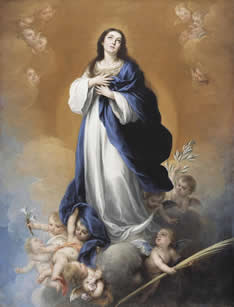|
Sacred Scriptures/Liturgy- Commentary on
Solemnity of the Immaculate Conception |
"Mary Is a
Model Who Works With Us and in Us"
Fr. Raniero Cantalamessa, OFMCap, Pontifical Household Preacher
Solemnity of the Immaculate Conception, 2006
www.zenit.org
ROME, DEC. 7, 2006 (Zenit.org).- Here is a translation of a
commentary by the Pontifical Household preacher, Capuchin Father
Raneiro Cantalamessa, on liturgical readings for the solemnity of
the Immaculate Conception.
* * *
Solemnity of the Immaculate Conception
Genesis 3:9-15, 20; Ephesians 1:3-6, 11-12; Luke 1:26-38
"Chosen to Be Holy and Immaculate"
So that we see how the solemnity of the Immaculate Conception is not
simply a celebration of the privileges of Mary but touches us and
involves us in a profound way, we have to understand it in the light
of the words of Paul in the second reading: "God the Father chose us
in Jesus Christ before the creation of the world, to be holy and
immaculate in his sight in charity."
We are all, therefore, called to be holy and immaculate; it is our
truest destiny; God's project for us. A little later, in the same
Letter to the Ephesians, Paul contemplates this plan of God, no
longer regarding it as applicable to men taken individually,
everyone for himself, but as applicable to the universal Church,
Bride of Christ: "Christ loved the Church and gave himself up for
her to sanctify her, purifying her with baptism and the word,
because he wanted her to appear in splendor, without blemish or
wrinkle but holy and immaculate" (Ephesians 5:25-27).
A human race holy and immaculate -- this is God's great purpose in
creating the Church. A human race that can finally appear before
him, that need not flee from his presence, its countenance
disfigured by shame, as Adam and Eve after the sin. A human race
that, above all, he can love and draw into communion with him,
through his Son in the Holy Spirit.
In this universal design of God, what does the Immaculate Conception
of Mary, which we celebrate today, represent? The liturgy responds
to this question in the preface of today's Mass when, turning to
God, it sings: "In her you designated the beginning of the Church,
Bride of Christ without blemish or wrinkle. ... You predestined her
above every creature to be an advocate of grace and a model of
holiness for your people."
This, therefore, is what we celebrate in Mary today: the beginning
of the Church, the first fulfillment of God's design. She is the one
in whom there is a promise and guarantee that the whole plan will be
accomplished. "Nothing is impossible with God!" Mary is the proof of
this. In her there already shines forth all the future splendor of
the Church, as, on a peaceful morning, the azure countenance of the
sky is reflected in a single dew drop. And it is also for this above
all that Mary is called "Mother of the Church."
However, Mary is not only she who stands behind us, at the beginning
of the Church. She also stands before us as "model of holiness for
the people of God." We are not born immaculate as, by a singular
privilege bestowed by God, she was born; indeed, evil settles into
us in every fiber and in every form. We are full of "wrinkles" that
must be made smooth and "blemishes" that must be washed away. It is
in connection with this work of purification and recovery of the
image of God that Mary stands before us as a powerful reminder.
The liturgy speaks of her as a "model of holiness." The image is
correct, provided that we move beyond human analogies. Our Lady is
not like human models, who pose and remain still so that they can be
painted by an artist. Mary is a model who works with us and in us,
who guides our hand as we trace the outlines of the model par
excellence, Jesus Christ, so that we might be "conformed to his
image" (Romans 8:29).
She is "advocate of grace" before she is model of holiness. Devotion
to Mary, when it is enlightened and ecclesial, does not really draw
believers away from the one Mediator, but brings them to him. Those
who have had a true and authentic experience of Mary in their lives
know that it brings them to the Gospel and to a deeper knowledge of
Christ. She stands before all Christians always repeating what she
said at Cana: "Do whatever he tells you."
[Translation by ZENIT]
Return to Hearts of Jesus and Mary...
This page is the work of the Servants of the Pierced Hearts of Jesus and
Mary